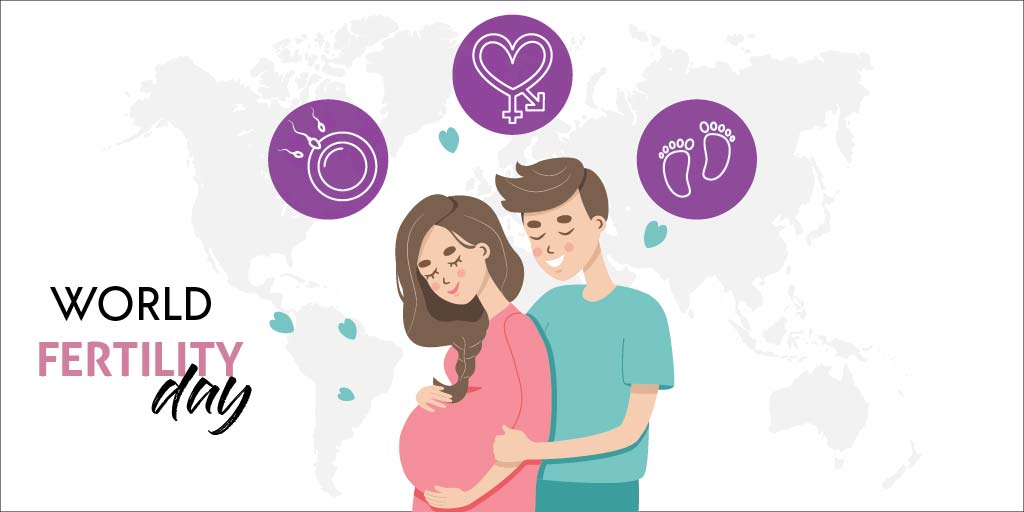World Fertility Day is observed on November 2. The goal of World Fertility Day is to help and guide people dealing with fertility problems. People are encouraged to share their stories and offer support to those who are dealing with reproductive problems. The purpose of this worldwide fertility day is to encourage individuals to freely share their own journeys and experiences with infertility with one another in order to inspire others to speak out and increase awareness.
Infertility: What Is It?
The failure to achieve a clinical pregnancy following 12 months of regular, unprotected sexual activity is what is known as infertility. Numerous couples facing difficulties in conceiving naturally turn to fertility treatments such as IVF, and this phenomenon is widespread globally.
The first baby conceived through in vitro fertilization (IVF) was born in 1978, marking a groundbreaking milestone. Millions of babies have been born with the help of IVF since that landmark more than 40 years ago. Enhanced medical technology and sustained research efforts consistently contribute to the realization of the dreams of women and families, helping them achieve successful pregnancies.
The Primary Contributors to Infertility
The following are the most typical causes of infertility in males:
- Disorders affecting the amount, quality, and motility of sperm
- Varicocele conditions
- Retrograde ejaculation
- Immunologic infertility
- Hormones
The following are the most typical causes of infertility in females:
- Endometriosis
- Ovarian cancer
- PCOS (polycystic ovary syndrome)
- POI is primary ovarian insufficiency.
- Uterine fibroids
- Interstitial cystitis (IC)
- Chlamydia, gonorrhoea, and HIV
- Fertility decreases gradually after age 35.
Tests and Diagnosis of Infertility
Numerous diagnostic procedures are available to help in determining the reason for infertility in both men and women. A fertility specialist will suggest particular diagnostic tests after a couple has undergone evaluation through a thorough physical examination and medical history.
Doctors often examine the female pelvis, the vagina, the cervix, the female hormone system, and the ovarian reserve to diagnose infertility in women. Medical professionals identify male infertility by studying semen. Additional testing may be necessary for both men and women depending on the findings.
Natural Ways to Increase Fertility
Pick healthy foods, keep a healthy weight, hydrate yourself, minimise your stress, take prenatal vitamins, keep track of your ovulation, give up tobacco and alcohol.
Fertility Treatments
Doctors perform certain examinations on women, which can range from basic ovulation calendars to examining hormone levels and imaging tests.
Types of Fertility Treatments
In vitro fertilisation (IVF)
With the use of a tiny needle inserted through the top of the vagina, a doctor uses in vitro fertilisation (IVF) to remove eggs from the ovaries. In the lab, embryologists initiate the fertilization procedure by combining the retrieved eggs with prepared semen. Following this, the embryologists insert the resulting embryo back into the uterus using a tiny catheter introduced through the cervix.
Intracytoplasmic sperm injection (ICSI)
Using a microscope and advanced tools, the doctor performs an intracytoplasmic sperm injection (ICSI) procedure in which he injects one sperm into each egg. As part of the IVF treatment cycle, ICSI is carried out.
When the male partner has poor sperm quality, doctors often recommend ICSI to enhance the likelihood of fertilization. In reality, males who have been diagnosed with male infertility can benefit greatly from ICSI treatment. Occasionally, surgeons can surgically extract sperm from the testicle or epididymis for men with no sperm in the ejaculate. Furthermore, doctors can perform donor insemination (DI), wherein they use intrauterine insemination to deposit donor sperm into the uterus.
Conclusion
World Fertility Day is a day of hope and empowerment for those facing fertility challenges. It’s about spreading awareness, inspiring, and breaking the silence around infertility. By sharing experiences and supporting one another, we can create change and offer hope to those seeking to start a family.
Furthermore, World Fertility Day is your opportunity to make informed choices about your fertility care. By educating yourself about fertility and available treatments, you can make well-informed decisions when selecting the right fertility package for your needs. It’s a day that empowers you to make informed choices on your path to starting a family.
